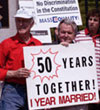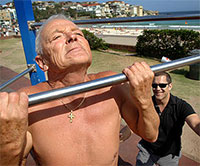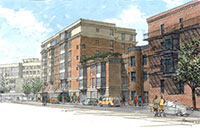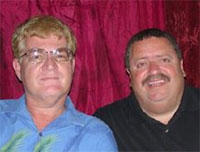News
Gay America Turns Gray
By Scott Stiffler - EDGE Contributor
Sunday, June 01, 2008

LGBTs who are currently in their 60s, 70s, 80s and beyond have lived through most of their years during an era when the closet was the rule rather then the exception; they’ve seen the dawn of the modern gay rights movement and survived the AIDS crisis. Now, they’re becoming pioneers in yet another moment of queer cultural significance: the graying of gay America.
The number of seniors (gay, straight and otherwise) is expected to grow from twelve to twenty percent of the U.S. population within the next quarter century -- translating into as many as five million LGBTs. With same sex marriage looming as the inevitable law of the land, the increased amount of LGBTs adopting and having children and an unprecedented era of visibility and acceptance, the future looks brighter than ever for those spending their senior years out of the closet; but along with the unprecedented opportunities come a myriad of unique and unexpected challenges.
 Living Single
Living Single
The current generation of LGBT seniors are twice as likely to live alone as their heterosexual counterparts." notes Karen Taylor, Director of Advocacy and Training for SAGE (a national social service and advocacy organization dedicated to LGBT senior citizens; sageusa.org). "What that means in terms of senior services, is that this generation will be very much at risk for things like falling, depression, malnutrition and substance abuse. When they do seek help by checking into a hospital, they have to identify who’s going to take them home. Many older LGBTs experience additional stress because they don’t have a person in their lives like that to rely upon."
This lack of life partners, close relatives or children directly translates into decreased support for aging LGBTs -- a major a concern of Gail Gazelle, MD (Assistant Professor of Medicine at Harvard Medical School and President the patient advocacy practice MD Can Help). Gazelle: "Sadly, I think the biggest issue for the graying gay community is a different form of ’the haves vs. the have nots.’ I’m not talking about money here; the main issue for gays as they age is whether they have someone in the next generation looking out for them or not. As a physician seeing many geriatric cases, this is the most important factor. And although we have experienced a lesbian baby boom, many lesbians came of age at a time when it was distinctly ’uncool’ to become mothers.
For gay men, it’s only recently and in very few geographic areas of the country, that it is now acceptable for them to become dads. My recommendation: cultivate relationships with those nieces and nephews now!"
From WWII to Generation X
Those in their late 70s and 80s who grew up in the years during and just beyond World War II (the Greatest Generation) are still living with the consequences of, according to Taylor, "coming of age when being open about their sexuality was a life threatening act of courage. Their expectations are shaped by the necessity of surviving rather than the aspiration of thriving. There was institutionalized oppression in many forms. Theirs was a generation that could expect to be fired, lose their children, and be limited in jobs if they were out."
The relatively newfound freedom to express your sexual identity came to them late in life -- whereas the next generation (the Baby Boomers) will forever be thought of within "the context of the Stonewall rebellion. They created the modern gay rights movement and have embraced their sexual orientation and gender identity. This generation is far more insistent in combating marginalization. They harbor a much higher expectation about opportunities and fulfillment in their later years."
But what does that mean for Generation X; the cynical adolescents of the 70s whose formative years were informed by the cautionary evils of Watergate and disco -- whose adolescence occurred long before gay/straight alliances and just after HIV? As usual, they’ll lick their wounds by reaping the many benefits initiated by Boomers (who gave them Stonewall, AIDS activism and gay rights legislation -- and are poised to make being old in the twenty-first century as hip as being young in the 1960s).
If coasting on the efforts of their slightly older predecessors seems unfair, Taylor reminds us that it’s the inevitable result of advances on the part of time and society -- and everybody does it. She traces this from "the Greatest generation, who never had expectations they’d be able to marry the one they love; to Boomers, who crafted public policy; to Generation Xers who will see the fruits of that, in terms of quality of life."
 Creating Communities
Creating Communities
Ultimately, old age -- like the rest of life -- is what you make of it. While many LGBTs from the Greatest Generation are living alone or in mainstream nursing homes, an increasing number of forward-thinking Boomers have been busy creating LGBT-focused group homes, retirement communities and gayborhoods (gay neighborhoods) that harkens back to the communes of the 60s. This time around, though, there are adjustments to be made (primarily due to the fact that their days of communal living and its requisite elements of openness and compromise are forty years in the past). Still, learning to live with others all over again is better than living alone.
"As people get older, no matter who they are, there is a tendency to isolate." says David Aronstein, President of Stonewall Communities. "This is for people looking to live in community with each other; to know the people down the hall share similar values and interest. Things that seem simple when you are fifty can be difficult when you’re eighty; the upkeep of a house or negotiating the health care system. This is a community where people will be able to get that help."
As a Boston area building containing fifty-three apartments for LGBTs, Stonewall Communities will likely begin construction in "at least two years, because most of the people who want to live there will need to sell their house. (see graphic for an artist’s rendering of the community.) The real estate market is frozen at the moment." Currently, Aronstein notes that those sitting on the Board of Directors represent age groups from the mid-forties to the late seventies. All share the common vision to "create an independent living community; each of the apartments are fully equipped. On the ground floor, there will be a dining room, kitchen, library, fitness center and a staff person to help people get services they the personal or home health care services they need." In an effort to serve the community outside of their building, they’ve also created "a program called Stonewall Connections that knits together services providers that we’ve screened. The reality is most people want to age in place; they like where they live and they want to stay there. Some cannot manage steps or deal with the upkeep of the house. Connections is a program that will help people stay in their own homes if that’s where they want to be."
Dr. Forrest Hong is a social worker, aging expert and President of a company called Senior Savvy who is on the board of Triangle Square (www.gleh.org), a gay and lesbian elder housing project in Hollywood, California that serves moderate to low income residents. Federally funded with designated space for specific levels of income and those with HIV/AIDS, its four floors and two hundred-plus units is "about a year old; probably one of the first buildings built with the primary intention of serving LGBTs who are aging by providing a safe environment including housing and social services."
In a supremely ironic consequence of living among other LGBTs, Hong says that many residents experience difficulty living in a community of openness where they are free to be who they are: "The building was created so they can feel comfortable, but they have difficulty adjusting to that level of comfort. This reluctance to openness stems from a longstanding sense of repression and not being able to be who you are." Hong explains this as the result of the adjustment between two types of environments; living a life of secretiveness and now being given an opportunity to live openly: "People are going through psychological adjustments. There was a demand to speak to professionals about the transition. They were concerned about safety.
Although they were now living in an openly gay community, there was fear that people would come and watch them; fear of physical attack; even some fear of going out of the building, because they would be identified as gay. That is a fear they never exhibited when they lived in non designated building."
Welcome to the Gayborhood
Stephen J. Lisante (53) and Roger P. Donnelly (47) (pictured) recently made the move from "an all straight street in Springfield, Virginia to what was an all gay cul-de-sac in Cathedral City, California." The couple moved to the sunny and considerably more liberal climate "mostly to avoid weather, but also to escape the bizarre turn that Virginia politics had taken. We filed for domestic partnership within a few months of moving here and will probably get married sometime this summer." says Donnelly. "Once we moved here, we filed for domestic partnership. We both so amazed at the progress made (which we NEVER thought we’d live to see) that the whole marriage thing is sort of superfluous -- though we will definitely do it -- for us the domestic partnership is more than we every thought we’d have for legal protection."
In California, Donnelly and Lisante sought and found "an area where being gay would not be an issue. We had no desire to come home in our 60s to face a house spray painted and have the police react negatively. Living out here reduces so much of the concern -- as we do not need to worry about a legislature deciding that the legal documents binding our lives and finances together can be overruled. When we left Virginia, it was in the process of passing anti-gay legislation that might call into question the legality of wills and other arrangements we made to protect each other. Here in California, already with the domestic partnership arrangement, the atmosphere is so much more positive. Taking that whole issue off of the table as we get older is a great relief."
 What’s Next for Gray Gayness?
What’s Next for Gray Gayness?
One of the greatest challenges of getting older has nothing to do with sexuality -- and everything to do with how America treats its elders as it struggles with the skyrocketing costs of health care. Taylor sees the social and medical issues facing LGBTs as "reflective of the larger senior population. Our health and senior service organizations have not adequately kept up. It’s a national conversation; how do we shift to meet the expectations of the boomer generation?"
To that end, she notes how service providers and policy maker are looking more towards the LGBT community to identify models of organization and services: "Those in underrepresented, underserved communities do not get the benefit of recognition and funding that goes to larger agencies." As a result, we become more creative and flexible. "That has generated very different and successful models that mainstream agencies are interested in replicating. Taylor cites as an example, "The AIDS crisis twenty years ago; when we had nobody except our own community addressing the needs of the dying, we created organizations and service. We advocated, we organized and we built responses that have helped shape what health policy looks like in this country and created models for other chronic illness programs."
Hong strikes an optimistic tone when asked to project ahead and assess what life will be like for the Boomers, Generation X, Generation Y and those who’ve yet to be given a generational moniker. He sees the LGBT lifestyle as gradually but surely becoming more acceptable: "Lifestyle and gender issues will be fairly non-existent. Parts of the country will have resistance, but the younger population as I see it is a lot more open to this, because there are kids growing up in same sex marriages as adopted kids. They’re straight and they don’t worry about the fact that if they come to these meetings and relate that they are going to become gay." Like their graying LGBT elders, the current and next generation is poised to thrive by embracing "a whole different attitude."
